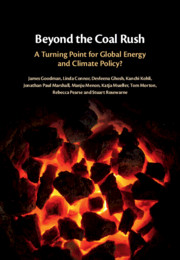Book contents
- Beyond the Coal Rush
- Beyond the Coal Rush
- Copyright page
- Contents
- Figures
- Tables
- About the Authors
- Foreword
- Acknowledgements
- Introduction
- 1 The Global Contest over Coal and Development
- 2 India
- 3 Australia
- 4 Germany
- 5 Laying the Foundations of the Coal Rush
- 6 Kyoto and the Coal Boom
- 7 Coal in a Climate-Constrained World
- 8 Conclusion
- References
- Index
4 - Germany
Globalising the Local to Reach the National, Protest against Coal in the Lausitz
Published online by Cambridge University Press: 06 November 2020
- Beyond the Coal Rush
- Beyond the Coal Rush
- Copyright page
- Contents
- Figures
- Tables
- About the Authors
- Foreword
- Acknowledgements
- Introduction
- 1 The Global Contest over Coal and Development
- 2 India
- 3 Australia
- 4 Germany
- 5 Laying the Foundations of the Coal Rush
- 6 Kyoto and the Coal Boom
- 7 Coal in a Climate-Constrained World
- 8 Conclusion
- References
- Index
Summary
Chapter 4 focusses on proposed brown coal mines for Lusatia, a region of Eastern Germany on the Polish border. The mines aimed to extend existing concessions, supplying coal for the nearby power generators. They were owned by the Swedish state-owned corporation Vattenfall, which sold them to a Czech conglomerate in 2016. The developmentalist argument for the mining is addressed first, especially in terms of its strategic value for German ‘energy security’. We examine the debates about coal’s economic necessity as a ‘transition fuel’ in Germany’s Energiewende, and its environmental or climate impacts. These themes are then developed in analysing the governance framework for the mine approval and opposition to it. The chapter shows how local opponents mobilise established conceptions of home or ‘heimat’ against the mining. These scripts, centred on local values of belonging in place, are integrated with concerns about impacts on livelihood and environment, and with concerns about climate change. The direct contradiction between Germany’s post-industrial ‘green economy’ and its determination to expand emissions-intensive brown coal is particularly powerful, not least as it destabilises technocratic authority.
- Type
- Chapter
- Information
- Beyond the Coal RushA Turning Point for Global Energy and Climate Policy?, pp. 116 - 155Publisher: Cambridge University PressPrint publication year: 2020



